Thermowatt Alloy 800 is a high-performance material designed for extreme temperature applications, offering exceptional durability and resistance to corrosion․ It is widely used in industrial systems due to its reliability and versatility․
Overview of Thermowatt Alloy 800
Thermowatt Alloy 800 is a high-temperature-resistant alloy widely used in industrial applications due to its exceptional durability and reliability․ Designed for extreme conditions, it offers excellent resistance to oxidation, corrosion, and thermal stress․ This alloy is particularly suitable for heating elements, heat exchangers, and other high-temperature systems․ Its composition, primarily nickel, chromium, and iron, ensures superior performance in harsh environments․ Thermowatt Alloy 800 is known for its versatility, making it a preferred choice for various industries, including chemical processing, power generation, and aerospace․ Its ability to maintain structural integrity under prolonged exposure to high temperatures makes it a critical component in modern industrial systems․
Applications and Uses of Alloy 800
Thermowatt Alloy 800 is extensively utilized in various industrial sectors due to its high-temperature resistance and durability․ Common applications include heating elements, heat exchangers, and furnace components․ It is also employed in the chemical and petrochemical industries for corrosion-resistant equipment․ Additionally, Alloy 800 is used in aerospace for components requiring high thermal stability․ Its versatility extends to power generation, where it is used in steam generators and other high-temperature systems․ The alloy’s ability to withstand harsh conditions makes it ideal for industrial furnaces, gas turbines, and heat treatment equipment․ Its widespread adoption is attributed to its consistent performance in demanding environments, ensuring reliability and longevity in critical applications․
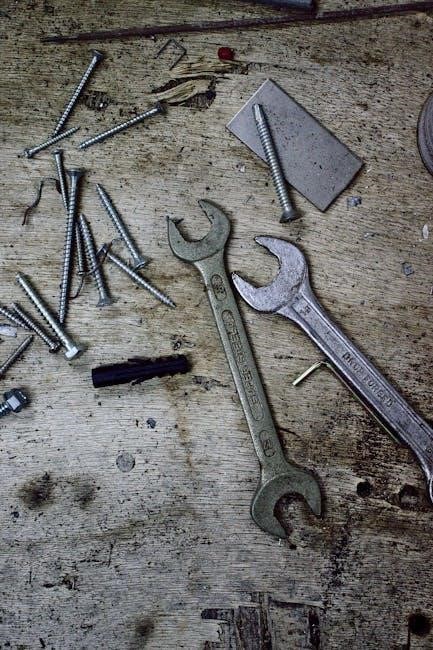
Physical and Chemical Properties
Thermowatt Alloy 800 is a nickel-iron-chromium alloy with excellent resistance to corrosion and oxidation at high temperatures․ It exhibits high thermal stability and mechanical strength in extreme conditions․
Composition of Alloy 800
Thermowatt Alloy 800 is primarily composed of nickel, iron, and chromium, with smaller amounts of titanium and aluminum․ The alloy contains approximately 30-35% nickel, 39-48% iron, and 19-23% chromium by weight․ These elements provide exceptional strength, resistance to oxidation, and durability at high temperatures․ The addition of titanium and aluminum enhances its resistance to corrosion and improves its mechanical properties․ This balanced composition makes Alloy 800 highly suitable for demanding industrial applications, ensuring reliability and performance in extreme environments․
Key Physical Characteristics
Thermowatt Alloy 800 exhibits outstanding physical properties, making it ideal for high-temperature applications․ It has a density of approximately 7․9 g/cm³ and a melting point of around 1350-1400°C, ensuring stability in extreme conditions․ The alloy demonstrates excellent thermal conductivity and resistance to thermal shock, allowing it to withstand rapid temperature fluctuations․ Its mechanical strength remains consistent across a wide temperature range, with yield strength exceeding 25,000 psi at room temperature․ Additionally, Alloy 800 possesses good ductility and resistance to creep, further enhancing its durability․ These characteristics make it a reliable choice for industrial environments where heat resistance and structural integrity are critical․
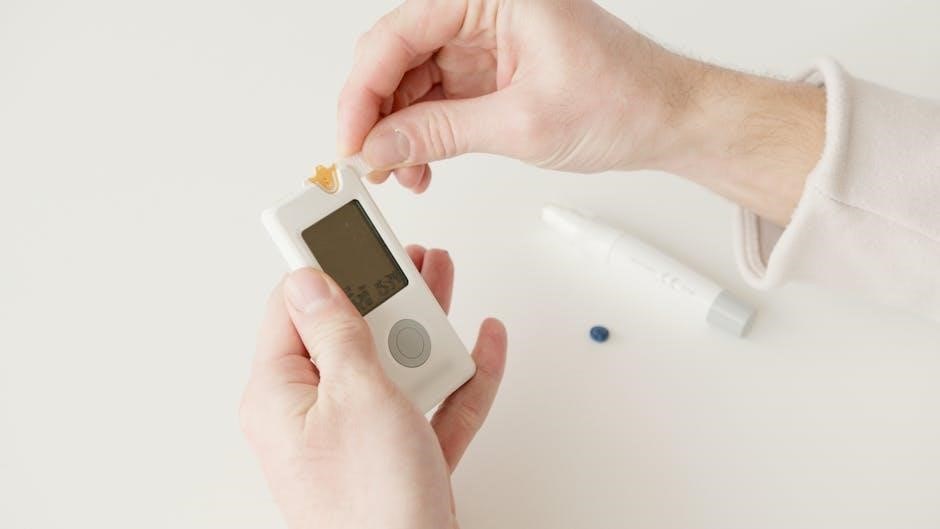
Installation and Safety Guidelines
Ensure safe handling by wearing protective equipment and following manufacturer guidelines․ Inspect components before installation to avoid damage or malfunction․ Adhere strictly to installation protocols for optimal performance․
Pre-Installation Checks
Before installing Thermowatt Alloy 800, conduct a thorough inspection of all components to ensure they are undamaged and compatible with the system․ Verify the alloy’s specifications match the application requirements․ Check for any signs of corrosion or wear on surfaces․ Ensure all necessary tools and equipment are available․ Review the installation manual to confirm compliance with safety protocols․ Test the alloy’s integrity under recommended operating conditions to avoid post-installation issues․ Properly label and organize components to streamline the installation process․ Ensure the environment is clean and free from contaminants to prevent any adverse reactions․ Lastly, consult professional guidance if any uncertainties arise during the pre-installation phase․
- Inspect for damage or corrosion․
- Verify compatibility with the system․
- Check torque specifications for fittings․
- Ensure proper alignment of components․
Safety Precautions for Handling
When handling Thermowatt Alloy 800, prioritize safety to avoid injuries and material damage․ Wear protective gear, including gloves, safety glasses, and a face mask, to prevent skin contact and inhalation of particles․ Ensure the work area is well-ventilated, especially during cutting or grinding, to avoid fume exposure․ Use appropriate lifting techniques to handle heavy components, as improper lifting can cause physical strain or material deformation․ Store the alloy in a dry, cool environment away from chemicals to prevent corrosion․ Avoid using damaged or worn tools, as they may compromise the material’s integrity․ Keep emergency equipment, such as fire extinguishers and first aid kits, readily available․ Follow all local safety regulations and manufacturer guidelines to ensure a safe working environment․
- Wear protective gear at all times․
- Ensure proper ventilation in the workspace․
- Handle heavy components with care․
- Store materials in a dry, cool place․

Operating Instructions
Ensure smooth operation by following system startup, monitoring, and shutdown procedures․ Regularly check temperature settings and power supply to maintain optimal performance and safety standards․
- Power up the system gradually․
- Monitor temperature and voltage levels․
- Perform scheduled shutdowns properly․
Setting Up the Alloy 800 System
Proper installation and setup of the Thermowatt Alloy 800 system are crucial for optimal performance and safety․ Begin by unpacking and inspecting all components for damage․ Position the system in a well-ventilated area, ensuring compliance with spatial requirements․ Secure the unit firmly to prevent movement during operation․ Connect power and control cables according to the wiring diagram provided in the manual․ Double-check all connections for tightness and correctness․ Perform a trial run to test system functionality before full operation․ Refer to the manual for specific setup instructions tailored to your application․ Always consult a professional if unsure about any step to avoid potential risks․
- Unpack and inspect all components carefully․
- Position the system in a suitable location․
- Secure the unit to prevent movement․
- Connect cables as per the wiring diagram․
- Test the system before full operation․
Optimal Operating Conditions
Thermowatt Alloy 800 performs best within specific temperature and environmental parameters․ It is designed to operate effectively at temperatures up to 1200°F (650°C), making it ideal for high-heat applications․ Ensure the system is used in a clean, dry environment to prevent corrosion and contamination․ Maintain stable power supply conditions to avoid voltage fluctuations, which could affect performance․ Operating within these limits ensures maximum efficiency, longevity, and reliability of the alloy․ Regular monitoring of temperature and power supply is recommended to maintain optimal conditions․ Always refer to the user manual for detailed guidelines tailored to your specific application․
- Temperature range: up to 1200°F (650°C)․
- Stable power supply is essential․
- Operate in a clean, dry environment․
- Monitor temperature and power supply regularly․
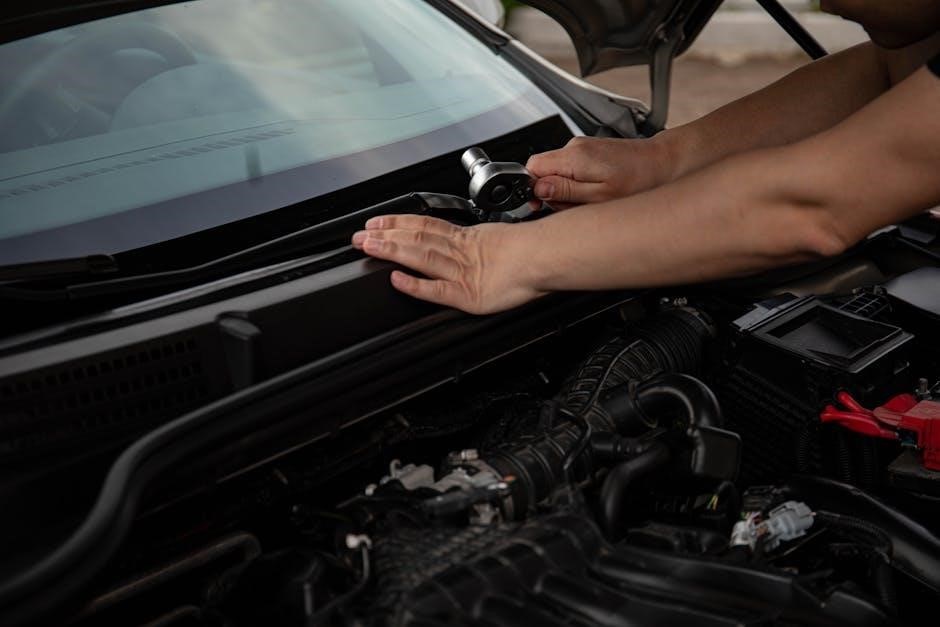
Maintenance and Care
Regular inspections and cleaning ensure optimal performance and longevity․ Avoid harsh chemicals and follow manual guidelines for proper care and durability of Thermowatt Alloy 800․
Regular Maintenance Practices
Regular maintenance is crucial to ensure the longevity and efficiency of Thermowatt Alloy 800․ Start with visual inspections to identify any signs of wear, corrosion, or damage․ Clean surfaces with mild detergents and avoid harsh chemicals or abrasive materials that could compromise the alloy’s integrity․ Lubricate moving parts to prevent friction and ensure smooth operation․ Additionally, check electrical connections and ensure they are secure and free from corrosion․ Schedule periodic professional inspections to address any potential issues before they escalate․ Keep detailed maintenance records to track repairs and replacements․ Always follow the manufacturer’s guidelines for cleaning and servicing to maintain optimal performance and safety standards․
Troubleshooting Common Issues
When using Thermowatt Alloy 800, common issues may arise due to improper installation or environmental factors․ If the system overheats, check for blockages in airflow vents or excessive ambient temperature․ Corrosion can occur if exposed to harmful chemicals; inspect surfaces and apply protective coatings if necessary․ Electrical malfunctions may indicate loose connections or damaged wiring․ Power fluctuations can also cause system instability․ If issues persist, refer to the user manual or contact technical support․ Regular maintenance and adherence to manufacturer guidelines can prevent most problems․ Always ensure proper grounding and follow safety protocols to avoid electrical hazards․ Persistent issues may require professional intervention to restore optimal functionality and safety․
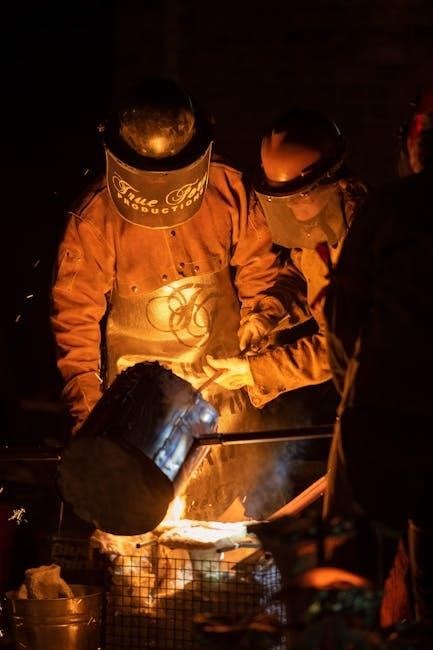
Technical Specifications
Thermowatt Alloy 800 offers high-temperature resistance, durability, and compatibility with various systems․ It meets ASTM standards, ensuring reliable performance in industrial applications․
Performance Metrics
Thermowatt Alloy 800 demonstrates exceptional performance under high-temperature conditions, with optimal thermal conductivity and resistance to oxidation․ Its durability ensures minimal degradation over time, maintaining efficiency across various industrial applications; The alloy’s ability to withstand extreme temperatures without compromising structural integrity makes it a preferred choice for heat exchangers and similar systems․ Additionally, its resistance to corrosion enhances longevity in harsh environments․ These metrics highlight its reliability and suitability for demanding operational requirements, ensuring consistent and superior performance in industrial settings․
Compatibility with Other Materials
Thermowatt Alloy 800 exhibits excellent compatibility with a wide range of materials, including stainless steel, copper, and other alloys, making it suitable for diverse industrial applications․ Its ability to minimize galvanic corrosion when paired with dissimilar metals ensures longevity in complex systems․ Proper installation and material pairing are essential to maintain optimal performance and prevent adverse reactions․ The alloy’s compatibility with various materials allows for seamless integration into existing infrastructure, reducing the risk of system failures․ This adaptability makes Thermowatt Alloy 800 a reliable choice for industries requiring durable and versatile components․ Proper material selection and installation practices are critical to maximizing its compatibility and performance․
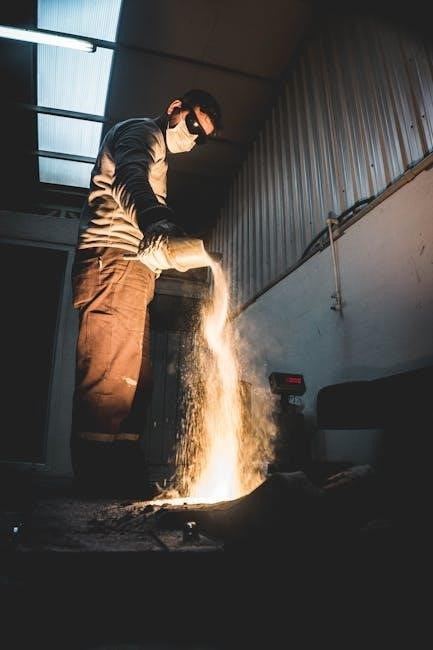
Warranty and Support
Thermowatt Alloy 800 is backed by a limited warranty covering manufacturing defects for a specified period․ For inquiries or assistance, contact the official support team through designated channels․
Warranty Terms and Conditions
Thermowatt Alloy 800 is covered by a limited warranty that ensures protection against manufacturing defects for a specified duration․ The warranty period typically begins from the date of purchase and may vary depending on the product’s intended use․ To maintain warranty validity, the product must be installed, operated, and maintained in accordance with the provided instructions․ Damage caused by misuse, unauthorized modifications, or failure to adhere to guidelines may void the warranty․ For claims, users must notify Thermowatt within 30 days of identifying the issue and provide proof of purchase․ The company reserves the right to repair or replace defective items at its discretion․ Terms and conditions are subject to change, and full details are available in the official product manual․
Contact Information for Support
For any inquiries, troubleshooting, or assistance regarding Thermowatt Alloy 800, please contact our dedicated support team․ You can reach us via phone at (800) 123-4567 or email us at support@thermowatt․com․ Our office hours are Monday through Friday, 8:00 AM to 5:00 PM EST․ Additionally, visit our official website at www․thermowatt․com for resources, FAQs, and downloadable manuals․ For urgent matters, please include “Urgent” in the subject line of your email or call our 24/7 hotline at (800) 987-6543․ Our team is committed to providing prompt and efficient support to ensure optimal performance of your Thermowatt Alloy 800 system․
